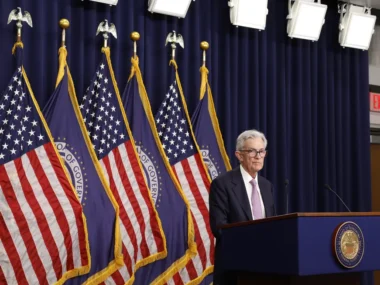The UN’s economic arm claims that a pro-growth attitude is necessary since rising interest rates are widening the income gap.
The UN’s economic arm has warned that unless central banks loosen their 2% inflation objectives and take a more pro-growth approach, they run the risk of pushing a stagnant global economy into a deep recession.
The UN said the significant increases in interest rates from the main central banks since 2021 had worsened inequality and decreased investment but proved to be an ineffective anti-inflation weapon, pointing to signs of an impending debt crisis in developing nations.
The UN Conference on Trade and Development (Unctad), which is based in Geneva, predicted that global growth would decline from 3% in 2022 to 2.4% in 2023, with little indication that it would pick up the following year.
“The global economy is stalling,” said Richard Kozul-Wright, director of Unctad’s division of globalization and development strategies, “with Europe teetering on the brink of recession, China facing strong headwinds, and financial stresses are reappearing in the United States.”The worst policy mix at the time for stabilizing the world economy is applying more fiscal pressure and maintaining high interest rates.
According to Unctad, the global economy is “at a crossroads” and the higher interest rates in developed nations like the US are disproportionately harming poorer countries. The UN’s sustainable development goals and the shaky economic recovery were both in danger of being undermined by a growing wealth divide.
The 2023 trade and development report stated that “debt burdens, the silent weight on many developing countries, remain a major concern.” “Rising interest rates, weakening currencies, and sluggish export growth have combined to squeeze the fiscal space for essential needs, transforming the growing debt service burden into an unfolding development crisis.”
The UN agency stated that solving the problem was crucial because satisfying the expectations of their creditors was “crushing too many developing countries” and that over a third of low- or lower-middle income “frontier economies” were on the verge of debt disaster.
Unctad noted that while inflation had decreased from its peak in late 2022, it had done so unevenly and was largely due to the easing of supply-side pressures. He also noted that the recent increase in oil prices would increase concerns about the cost of living at a time when insufficient wage growth was straining household budgets.
“Tighter monetary policy has so far contributed little to price easing and at a steep cost in terms of inequality and damaged investment prospects,” said Unctad. The 2% inflation objective should be relaxed, and central banks should take on a broader stabilizing role.
According to the research, both industrialized and developing nations should make lowering inequality a policy priority while closely monitoring the percentage of national income that goes to employees. It said that with firm pledges to comprehensive social safety, real, inflation-adjusted wages should rise in step with productivity development.
Rebeca Grynspan, the secretary general of Unctad, stated: “We must avoid the policy blunders of the past and embrace a positive reform agenda to safeguard the world economy from future systemic crises.
“To achieve financial sustainability, encourage productive investment, and improve employment, we need a well-balanced policy combination of fiscal, monetary, and supply-side measures. The growing disparities in the global trading and financial system require regulation.











